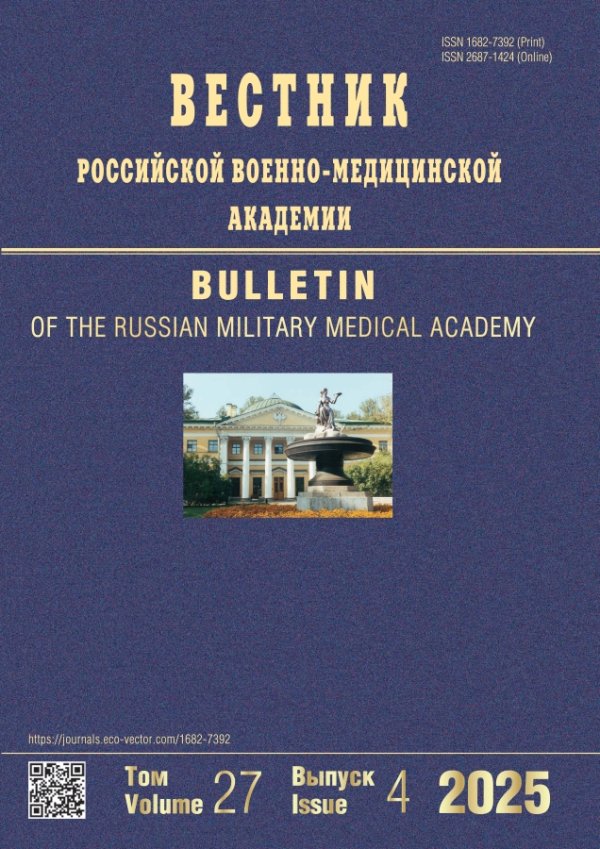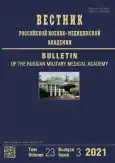Molecular and biological aspects of forecasting the oncological efficiency of cytoreductive surgery in metastatic colon cancer
- Authors: Sazonov A.A.1, Maistrenko N.A.1, Romashchenko P.N.1
-
Affiliations:
- Military Medical Academy named after S.M. Kirov of the Ministry of Defense of the Russian Federation
- Issue: Vol 23, No 3 (2021)
- Pages: 61-66
- Section: Clinical trials
- URL: https://journals.rcsi.science/1682-7392/article/view/73188
- DOI: https://doi.org/10.17816/brmma73188
- ID: 73188
Cite item
Abstract
Through an immunohistochemical study, the molecular biological properties of adenocarcinoma in patients with stage IV colorectal cancer with synchronous unresectable liver metastases, who underwent cytoreductive interventions for volume removal of the primary tumor, were examined. This study clarified the criteria for selecting patients with stage IV colon cancer with unresectable synchronous metastases in the liver for cytoreductive surgery from the standpoint of the molecular biological properties of the tumor. The prognostic significance of immunohistochemical markers such as the index of proliferative activity of stem cancer cells (ALDH + Ki-67 +) and the receptor for chemokines CXCR4 was established. The level of their expression correlates with the life expectancy of patients who underwent cytoreductive surgery. Thus, the high proliferative activity of cancer stem cells (ALDH + Ki67 + > 50%) and the high expression of chemokine receptor (CXCR4 > 70%) correlate with the rapid disease progression after surgical treatment. A significant inverse relationship was traced between the expression level of the receptor for chemokine CXCR4 as well as the proliferative activity of cancer stem cells and life expectancy of patients with stage IV colon cancer after cytoreductive surgery. The expediency of immunohistochemical studies in patients with metastatic colon cancer has been substantiated. Its implementation provides important information about the potential for tumor aggressiveness, which makes it possible to clarify the indications for performing cytoreductive surgery and improve the results of surgical treatment of this category of patients.
Full Text
##article.viewOnOriginalSite##About the authors
Aleksey A. Sazonov
Military Medical Academy named after S.M. Kirov of the Ministry of Defense of the Russian Federation
Author for correspondence.
Email: sazonov_alex_doc@mail.ru
ORCID iD: 0000-0003-4726-7557
SPIN-code: 4042-7710
doctor of medical sciences
Russian Federation, Saint PetersburgNicolay A. Maistrenko
Military Medical Academy named after S.M. Kirov of the Ministry of Defense of the Russian Federation
Email: nik.m.47@mail.ru
ORCID iD: 0000-0002-1405-7660
SPIN-code: 2571-9603
doctor of medical sciences, professor
Russian Federation, Saint PetersburgPavel N. Romashchenko
Military Medical Academy named after S.M. Kirov of the Ministry of Defense of the Russian Federation
Email: omashchenko@rambler.ru
ORCID iD: 0000-0001-8918-1730
SPIN-code: 3850-1792
doctor of medical sciences, professor
Russian Federation, Saint PetersburgReferences
- Bray F, Ferlay J, Soerjomataram I, et al. Global cancer statistics 2018: GLOBOCAN estimates of incidence and mortality worldwide for 36 cancers in 185 countries. CA Cancer J Clin. 2018;68(6):394–424. doi: 10.3322/caac.21492
- Kaprin AD, Starinskij AD, Petrova GV. Sostoyanie onkologicheskoj pomoshchi naseleniyu Rossii v 2017 godu. Moscow: MNIOI PA. Gercena filial FGBU «NMIRC» Minzdrava Rossii; 2018. 236 p. (In Russ.).
- Afanas’ev SG, Dobrodeev AYU. Citoreduktivnye operacii (Nuzhno li udalyat’ pervichnuyu opuhol’? Gde predel razumnoj citoredukcii?). Practical Oncology. 2014;15(2):93–100. (In Russ.).
- Hrykov GN, Strukov EYu, Romashchenko PN, et al. Rannyaya reabilitaciya posle hirurgicheskogo lecheniya raka obodochnoj kishki u bol’nyh pozhilogo i starcheskogo vozrasta. Bulletin of the Russian Military Medical Academy. 2014;(2):400. (In Russ.).
- Stillwell AP, Buettner PG, Ho YH. Meta-analysis of survival of patients with stage IV colorectal cancer managed with surgical resection versus chemotherapy alone. World J Surg. 2010;34(4): 797–807. doi: 10.1007/s00268-009-0366-y
- Aslam MI, Kelkar A, Sharpe D, Jameson JS. Ten years experience of managing the primary tumors in patients with stage IV colorectal cancers. Int J Surg. 2010;8(4):305–313. doi: 10.1016/j.ijsu.2010.03.005
- Ferrand F, Malka D, Bourredjem A. Impact of primary tumor resection on survival of patients with colorectal cancer and synchronous metastases treated by chemotherapy. Eur J Cancer. 2013;49(1):90–97. doi: 10.1016/j.ejca.2012.07.006
- Wang X, Mao M, Xu G. The incidence, associated factors and predictive nomogram for early death in stage IV colorectal cancer. International Journal of Colorectal Disease. 2019;34(7):1189–1201. doi: 10.1007/s00384-019-03306-1
- Raskin GA. Kliniko-morfologicheskaya ocenka prognosticheskih i prediktivnyh faktorov pri adenokarcinome tolstoj kishki: Dis. … d-ra. med. nauk. Saint Petersburg; 2015. 238 p. (In Russ.). Available from: https://search.rsl.ru/ru/record/01005557331
- Manihas GM, Majstrenko NA, Sazonov AA. influence of the age factor and tumor immunophenotype on the effectiveness of cytoreductive operations in metastatic colorectal cancer. Problems in Oncology. 2019;65(6):855–862. (In Russ.).
- Perfil’eva YV, Abdolla NN, Kustova EA. Ekspressiya markerov adgezii CD62L, CD44 i CXCR4 na NK-kletkah pri onkologicheskih zabolevaniyah. Cytokines and Inflammation. 2012;11(1):86–90. (In Russ.).
- Xu X, Pan Y, Feng Z. Low tumour PPM1H indicates poor prognosis in colorectal cancer via activation of cancer-associated fibroblasts. Br J of Cancer. 2019;120(10):987–995. doi: 10.1038/s41416-019-0450-5
Supplementary files









